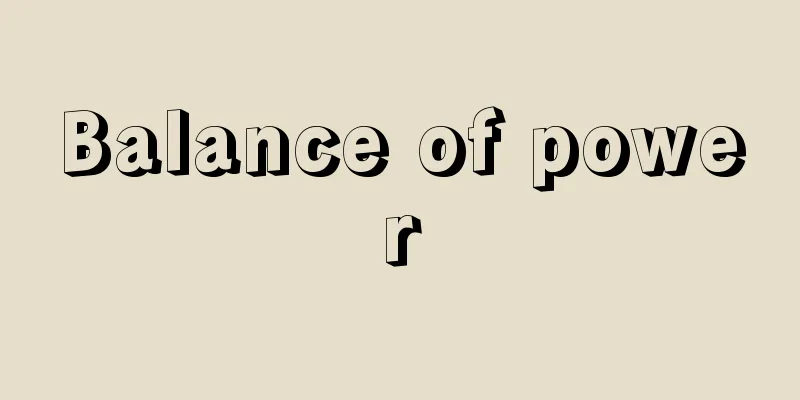Balance of power

|
In a heterogeneous international society where no common power exists, many sovereign states pursue their own national interests, but this does not allow any one state or group to hold superior hegemony, and by maintaining international balance, creates a situation in which mutual attacks are not possible, thereby contributing to peace and stability of nations and the international community as a whole. This principle or policy in international politics is called balance of power. Under a balance of power system, each country can increase its military power to improve its own security, or conversely, reduce its military power, or freely rearrange its alliances. There are two types of balance of power: direct confrontation and indirect competition. The history of balance of power as a political technique is long, but it is noteworthy that it dates back to the early modern period. From the establishment of the European international community after the Conference of Westphalia until the First World War, the balance of power functioned as a principle of European stability, along with the concept of national sovereignty and the principles of international law. The reasons for this include the fact that the power of the major European actors was roughly equal, the military power and political intentions of each country were limited, the existence of a common culture and system, and the fact that Great Britain played the role of a "balance adjuster." However, Great Britain also abandoned its "glorious isolation" since Henry VIII and entered into an arms race with Germany at the end of the 19th century, which prompted the outbreak of World War I. Real international politics still relies on the balance of power. However, there are problems with pursuing and maintaining peace in the international community through this. Peace based on the balance of power merely maintains the status quo, and is based on the fiction that national power is measurable. In reality, each country does not seek balance, but seeks power greater than that of the other party. In other words, the balance of power contains a mechanism for arms expansion, which always increases tension and becomes a cause of war. Therefore, peace under a balance of power is extremely unstable. After World War I, criticism of the balance of power increased, and the theory of collective security emerged, but as the failure of the League of Nations showed, it could not replace the balance of power. In the 20th century, the expansion of the international political arena to non-European territories, technological innovation and the emergence of nuclear weapons, and the diversification of international actors have all crumbled the foundations that had supported the balance of power in Europe, and it can now be said that the structural conditions for the existence of the balance of power have worn away. In that sense, a new global security paradigm must be sought. [Usui Hisakazu] "International Politics, Vol. 1 and 2, by F. L. Schumann, translated by Shinichi Nagai (1973, University of Tokyo Press) " ▽ "International Politics, by H. Morgenthau, translated by the Contemporary Peace Research Association (1986, Fukumura Publishing) " ▽ "Power Politics, by Sakio Takayanagi (1991, Yushindo)" [References] |Source: Shogakukan Encyclopedia Nipponica About Encyclopedia Nipponica Information | Legend |
|
共通の権力の存在しない不均質な国際社会で、多数の主権国家がそれぞれの国益を追求しながら、いずれの国家(群)が優越的なヘゲモニーを握ることをも排除し、国際間に均衡を図ることによって相互に攻撃ができないような状況をつくり、国家さらに国際社会の平和と安定に寄与する国際政治上の原理ないし政策を勢力均衡という。 勢力均衡の下では、各国は自国の安全を高めるために軍事力を増強したり、逆に軍縮をしたり、あるいは自由に同盟関係を組み替えることができる。そのタイプには直接的対峙(たいじ)と間接的競合の二つがある。政治技術としての勢力均衡の歴史は古いが、注目すべきは近世初頭以後である。ウェストファリア会議後のヨーロッパ国際社会成立から第一次世界大戦前まで、勢力均衡は、国家主権の概念、国際法の原則とともにヨーロッパ安定の原理として機能した。その理由として、ヨーロッパの主要主体間の力がほぼ同等であったこと、各国の軍事力と政治的意図が限定的であったこと、共通の文化・制度の存在、それにイギリスが「均衡調整者」の役割を果たしたことなどをあげることができる。そのイギリスもヘンリー8世以来の「光栄ある孤立」を捨て、19世紀末にはドイツとの軍備競争に突入し、第一次大戦の勃発(ぼっぱつ)を促した。 現実の国際政治は依然として勢力均衡に依拠している。しかしそれによって国際社会の平和を追求・維持することには問題がある。勢力均衡による平和は現状維持にすぎず、またそれは、国力が計量可能であるという擬制のうえに成り立っているが、現実には各国は均衡ではなく相手の力以上の力を求めようとする。つまり勢力均衡のなかには軍拡のメカニズムが内包され、それはつねに緊張を増幅させ、戦争の原因となる。それゆえ勢力均衡下の平和は、きわめて不安定なものである。第一次大戦後、勢力均衡への批判が高まり、集団安全保障理論が登場したが、国際連盟の失敗に示されているように、勢力均衡にとってかわるものとはなりえなかった。 20世紀に入り、国際政治の舞台の非ヨーロッパへの拡大、技術革新と核の出現、国際主体の多様化などによって、それまでヨーロッパの勢力均衡を支えていた基盤は崩れ、現在、勢力均衡の存立の構造的条件は摩滅したといえる。その意味において、新しいグローバルな安全保障パラダイムが模索されねばならない。 [臼井久和] 『F・L・シューマン著、長井信一訳『国際政治』上下(1973・東京大学出版会)』▽『H・モーゲンソー著、現代平和研究会訳『国際政治』(1986・福村出版)』▽『高柳先男著『パワー・ポリティクス』(1991・有信堂)』 [参照項目] |出典 小学館 日本大百科全書(ニッポニカ)日本大百科全書(ニッポニカ)について 情報 | 凡例 |
Recommend
tyurya
...Today, except in special cases, there is littl...
Genetrix
…There are various examples around the world of t...
Eurypterid - Eurypterid (English spelling)
A fossil animal belonging to the arthropod subphy...
Asama Highlands Road Race
…Auto racing as a subject of betting began in 195...
Meiwa [village] - Meiwa
A village in Oura County in southeastern Gunma Pre...
Potassium - Kariumu (English spelling) potassium English
It belongs to Group 1 of the periodic table and i...
Rasputin
Russian novelist. Born in a remote village between...
Fire pipe
A general term for devices used to ignite gunpowde...
National Railway Niigata Struggle - National Railway Niigata Struggle
In the spring offensive of 1957, Kokuro (National ...
The Three Doctors of the Kansei Era
Three Confucian scholars were central to the educa...
Jilin Province - Jilin
A province in northeastern China. Its abbreviated ...
Sendai Kujihongi - Chronicles of Ancient Matters
This is a history book that is assumed to have be...
dissolution
… [Dissolution in chemistry] Dissolution is the p...
Charles V - Charles
Son of Philip of Habsburg, he succeeded his matern...
Depopulation and overpopulation - Kasokamitsu
Depopulation and overpopulation are phenomena that...









